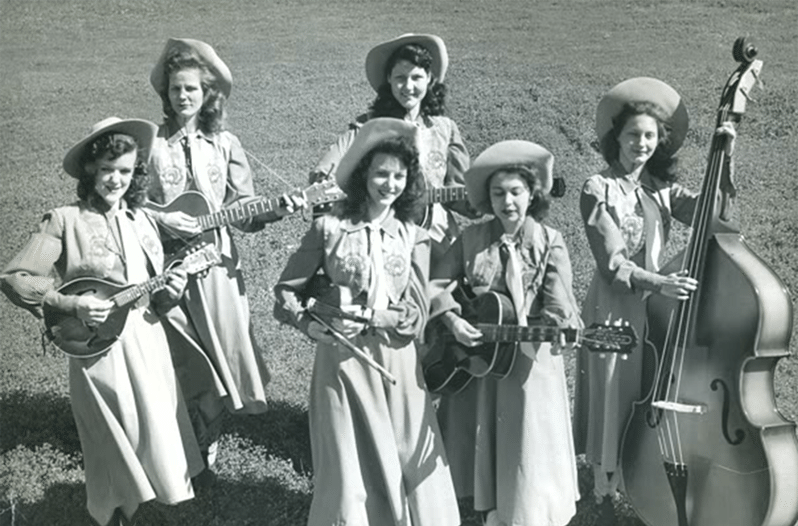In the 1940s, the Goree All Girl String Band was one of the most popular all-female country and western groups in America. The eight-piece band was flooded with fan letters filled with breathless admiration and marriage proposals. Local judges and business titans fawned over their angelic harmonies and rodeo sweetheart personas. In 1942, a World War II soldier stationed in Honolulu wrote a letter just to ask one of the women to sing "When Johnnie Comes Marching Home" to get the men in Company C ready for action. The Goree Girls were at the height of their music careers. The only problem was they were all locked up in prison in Huntsville, Texas.
Videos by Wide Open Country
The Goree Girls got their band name from Huntsville's Goree Unit, which was Texas' only women's penitentiary at the time. The girls, who were serving time for everything from murder to cattle rustling, spent their days at the Goree State Farm working in the fields, tending to the henhouse or sewing garments and bedding for the entire Huntsville prison system. Women who were considered to be acting out of line were under threat of the Red Heifer, a barbaric contraption made up of a two-foot strip of leather attached to a wooden handle. Even by prison standards, it was a dreary existence for the former housewives, waitresses and secretaries until one enigmatic inmate named Reable Childs hatched a plan.
The Goree All Girl String Band
WBAP, a Fort Worth radio station broadcast Thirty Minutes Behind the Walls, a weekly program that showcased the stories and talent of prisoners in the Huntsville system. Childs saw an opportunity to appeal to Texas governor W. Lee "Pappy" O'Daniel, who had latched himself to Texas-based western swing band The Light Crust Doughboys nearly a decade earlier. O'Daniel traveled with the Doughboys, using them to hype his business and political endeavors. (If Pappy seems familiar, he was portrayed by Charles Durning in O Brother, Where Art Thou? as the fiery governor who champions the Soggy Bottom Boys.)
Decked out in gold satin western shirts, ten-gallon hats and "riding britches," the Goree Girls performed western standards such as "Way Out West in Texas" and "I Want to Be a Cowboy's Sweetheart."
Childs, who played the banjo and steel guitar, was undoubtedly the star. She had beauty, talent, charisma and a Texas-sized backstory to rival a Larry McMurtry novel. She was sent to Goree in 1936 after she was found guilty of conspiring to kill her husband, Marlie Childs. Reable Childs had requested a divorce from her husband but Marlie Childs refused. One night, Reable's lover Terrence Bramlett shot Marlie Childs through the Childs' kitchen window. Once the police learned of Reable's affair, she was arrested and eventually sentenced to 25 years in prison.
Though Reable always maintained that she was innocent, she adapted to her new life as best she could. Childs was a model prisoner, taking on leadership positions and writing a column for Huntsville's inmate-run newspaper.
"Texas Jailhouse Music: a Prison Band History" by Caroline Cnagy features an excerpt from one of Reable's columns about her fellow inmates featured on Behind the Walls.
"They're so unassuming in our midst that we pass them unconcernedly at least six days a week, but when we hear them on the air it's different," Reable wrote."They are stars then, shining in our own little sky above our backyard, and we clasp hands on the back porch to dream little dreams that are made of stardust."
Singing for Freedom
The Goree Girls worked tirelessly, practicing in between shifts and after long workdays. They followed a grueling tour schedule. According to Texas Jailhouse Music: a Prison Band History, the Goree Girls had so many gigs the prison board debated whether the women were spending enough time serving their sentences behind bars. The band played county fairs and rodeos across the nation. On tour, the Goree Girls had a taste of freedom, riding Ferris wheels and eating real food. But the perks of fame were short lived.
The special treatment was surely a reprieve for the women. But the end goal was always to get an early release and go back to a life outside the harsh prison system. Eventually, the women would get their wish. Reable Childs was paroled in 1943 and nearly all of the original band's lineup were released over the next few years.
The Goree Girls were reduced to a footnote in American music history. There are no known recordings of their music. All that's left of their words and performances are the Behind the Walls transcripts archived by the Texas Department of Criminal Justice. But the story of the Goree Girls is a testament to how music can set you free, if only for a few moments.
The next time you drive through Huntsville, you might just hear a distant fiddle and banjo on the wind. Be sure to tip your hat to the Goree Girls.
This post was originally published on July 3, 2017.




